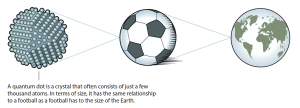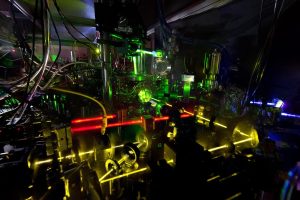Key Takeaways
- Reading a quantum clock can consume a billion times more energy than making it tick
- The act of measurement creates the irreversibility needed for timekeeping
- Findings could improve atomic clocks and quantum computer design
In a groundbreaking discovery, scientists have found that reading a quantum clock can cost a billion times more energy than keeping it running. This surprising insight challenges fundamental assumptions about timekeeping at quantum scales.
A multinational research team published their findings in Physical Review Letters on November 14, revealing that the energy required to observe a quantum clock’s time vastly exceeds the energy needed for its operation.
The Physics of Time and Entropy
Time’s forward direction is governed by entropy – the measure of disorder that always increases in isolated systems. This irreversible process allows clocks to create lasting records of the past.
While classical clocks reliably tick forward, quantum systems behave differently. Quantum processes produce minimal entropy, allowing quantum clocks to occasionally tick backward due to random fluctuations.
Building a Quantum Clock
Researchers constructed their quantum clock using a double quantum dot (DQD) – two microscopic semiconductor islands that can hold single electrons. The movement of electrons between these dots represented clock ticks.
The team used precise voltage controls to guide individual electrons through quantum tunneling across the dots, with each completed cycle counting as one tick.
The High Cost of Reading Time
To read their quantum clock, researchers employed a charge sensor that detected electron positions. This measurement process required significant energy, producing substantial entropy.
Using both DC and RF measurement techniques, the team could precisely quantify the thermodynamic costs of both clock operation and time observation.
Measurement Creates Irreversibility
The experiment yielded startling results: the entropy cost of reading the clock exceeded the cost of its operation by nine orders of magnitude – a factor of one billion.
Remarkably, the measurement process itself created the irreversibility needed for timekeeping. Even when the clock’s internal mechanism produced no entropy, continuous monitoring generated an irreversible record of time’s passage.
Implications for Future Technology
These findings have profound implications for atomic clock design and quantum computing. Current atomic clocks could achieve greater precision through more thermodynamically efficient measurement systems.
For quantum computing, understanding measurement energy costs is crucial for designing efficient quantum machines. The research contributes to broader work on quantum measurement thermodynamics.
The study suggests that time’s arrow – its clear forward direction – may emerge from the process of information extraction rather than being an inherent property of the microscopic world.







